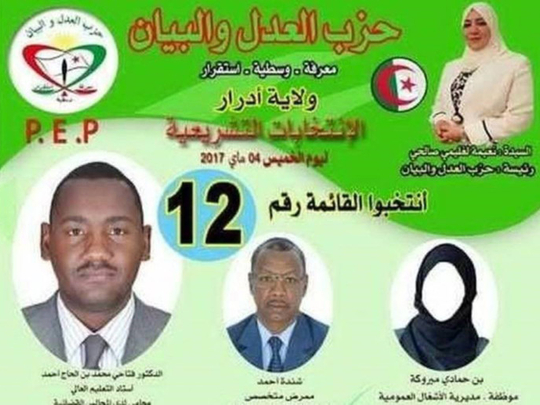
Algiers: Two Islamist opposition parties in Algeria have posted faceless portraits of female candidates for May’s legislative election, upsetting state authorities which have ordered them to show the faces or be barred from the ballot.
The dispute reflects fear among many Algerians of any revival of political Islam in a country that balances religious conservatism with searing memories of its 1990s war against armed Islamist groups that killed 200,000 people.
The ultra-conservative Salafi strain of Islam argues that their faith bans the faces of women being portrayed in public.
Election monitoring officials told Islamist opposition parties on Tuesday they had 48 hours to display the female candidates’ visages on campaign posters or their lists would be disqualified from the May 4 ballot.
“They must show their faces,” Abdul Wahab Derbal, the president of the body in charge of surveillance of the elections, told reporters on Tuesday.
Leaders of several Islamist parties criticised Derbal’s decision, saying it was neither fair nor constitutional.
“Our candidates are politicians not fashion models,” FNA party leader Moussa Touati told local media. “I will not tell my candidate to show their faces on the posters or flyers.” Another political leader, Naima Salhi, who has faceless women candidates on her party list said “authorities should respect Algeria’s religious traditions”.
In one election list in Adrar, two women candidates are seen faceless with only their name and profession shown. In another, a female candidate has removed both her face and family name.
Most of the cases have been registered in rural areas where religious conservatism is more prevalent than in the capital Algiers and other cities.
The elections are most likely to be dominated by the ruling National Liberation Front (FLN) and its allies who benefit from association with the North African state’s government, which spends oil and gas revenue heavily on a vast social welfare system ranging from housing to subsidised fuel and food.
The FLN along with the RND and other pro-government parties hold a majority in both chambers of parliament. Opposition parties are weak and split over how to challenge a system they say is controlled by a leftist old guard that dates to Algeria’s 1962 independence from France and backs the status quo.
Still, a move by several Islamist parties to join forces has spooked some Algerians with memories of the 1992 election, when the hardline Islamic Salvation Front (FIS) was set to win only for the army to cancel the vote and ban the party, triggering a decade of devastating war with Islamist militants.
The FIS remains outlawed but other Islamist parties are legal, along with secular and left-wing parties.
The poster debate has spilled into social media, with conservatives arguing the Salafist position that Islam forbids exhibiting women’s faces in public, even in posters. Others on social media have mocked the “ghost women” candidates.
Algerian electoral law states that each list of candidates must include a minimum of 15 per cent of women, a condition that aims to boost female participation in politics.
“How can these candidates reach out to their voters without being visible?” the Collective for Rights and Dignity of Algerian Women said in a statement.
“One cannot tolerate such a drift that undermines the dignity of Algerian women.”











